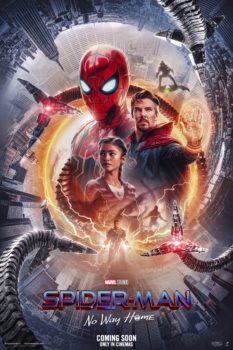 **Contains spoilers for Spider-Man: Far from Home**
**Contains spoilers for Spider-Man: Far from Home**
“Spider-Man: No Way Home” was arguably 2021’s most anticipated film for Marvel fans. Fans who had seen its prequel, “Far from Home,” were left on a cliffhanger in a post-credits scene that left fans in shock and excitement as Peter Parker’s identity was revealed to the world–the first time to ever happen in a live-action Spider-Man film. “No Way Home” picks up immediately after this shocking revelation, and follows the aftermath of how Parker deals with the consequences of this reveal. He decides to meet with Steven Strange in hopes of having him conjure a spell that would make everyone forget his identity, to which Strange agrees. However, things go wrong as the multiverse breaks apart, causing iconic Spider-Man villains to be brought in and spread chaos across New York.
The ambition of “No Way Home” pushes its limits in terms of stakes and ambition. The concept of the multiverse had been alluded to in “Far from Home,” but this film takes things to a new level by introducing threats such as Doctor Octopus, Electro, and the Green Goblin, among others. There is no shortage of fan service throughout numerous parts of the story, so die-hard fans will have no problem enjoying various callbacks and references to iconic Spidey moments.
One thing I wasn’t a fan of from the previous two films of the MCU trilogy was that their villains were connected to the one prominent figure in Peter’s life whose legacy loomed over its titular hero: Tony Stark. Despite these villains having clear motivations in terms of their opposition against Spider-Man, I never felt any sense of urgency or gravity with that aspect of the plot because I always knew Peter would turn up in the end with few consequences that impacted him.
This is where “No Way Home” breaks my long held preconceived notion. The story honors the Spider-Man tradition of responsibility in a way that brings the character full circle that is refreshing for the trilogy. Peter faces consequences that carry great emotional weight that feels impactful and true to the essence of what makes Spider-Man who he is, as well as what he stands for. It’s hard to say without going into great detail, but I was left impressed by how much growth Peter goes through within the film’s 2 hour and 28 minute runtime.
Compared to the previous two films, “Homecoming” and “Far from Home,” Tom Holland’s portrayal of Peter Parker/Spider-Man stands out as his best performance of the character among the trilogy. While still retaining that youthful charm Holland does exceedingly well at, he brings out a level of gravitas in this performance that was not seen very much in the past two entries. He achieves a good balance between humor, heart, and seriousness in a way that fleshes out his acting chops in a way I had only seen in his other film “The Devil All The Time.” Alfred Molina reprises his role as Doctor Octopus alongside Jamie Foxx as Electro, but I think it’s Willem Dafoe’s return as the Green Goblin that stole the show for me. Dafoe adds a new layer of depth to both sides of the character, bringing out the sympathetic qualities of Norman Osborn’s vulnerability to his alter-ego, as well as the menacing side of the Goblin himself. Performances from Zendaya, Jacob Batalon, and Marisa Tomei (as MJ, Ned, and Aunt May, respectively) complement Holland well as they’ve previously done in the past two films. The loved ones in Peter’s life act as the emotional pillar that keeps him grounded among all the fighting and troubles that weigh on his shoulders as the masked hero, which allows ample time to breathe from all the action.
Michael Giacchino’s score is a grand ensemble of sounds that is not necessarily new to most superhero movies, but it’s the way Giacchino uses the soundtrack in parts of the movie to elevate the emotion in certain scenes that I think works very well. Having said that, I don’t think I would say Giacchino’s score is necessarily as memorable or on the same level of Danny Elfman or James Horner’s score from the two previous Spider-Man trilogies, but that’s definitely not to say it’s bad. I think people, however, will gravitate to the soundtrack for some of the more standout themes than some, which could be considered a bit generic for those weary of superhero films in general.
“No Way Home” is many things: an action blockbuster, a coming-of-age tale, a love story, and so much more. However, I believe that the heart of the film lies in the fact that it is ultimately a celebration of Spider-Man and what he encompasses for fans around the world. In the past 5 years alone, fans have gotten two video games, two live-action movies, and an animated film whose sequel is coming out later this year–all based on the iconic superhero.
As the third film of the “home” trilogy, “No Way Home” rounds out Peter Parker’s character arc from the aspiring Avenger he dreamt of becoming to the hero he needed to be to protect his loved ones. “No Way Home” pushes world-shattering stakes that would concern greats like Iron Man or Captain America onto the friendly neighborhood Spider-Man that we all know and love. However, what makes this film click for me is that beneath a spectacle of supervillains and action is a story about responsibility and the tenacity it takes to do good by other people. Spider-Man was never about the web-swinging, the fighting, or the cool things that he can do. It was about the principles he stood for: responsibility, forgiveness, and the grit it takes to do what’s right. That’s what Spider-Man taught me growing up, and I think “No Way Home” is a celebration of those principles in a way that every Spidey fan can appreciate.





Comments